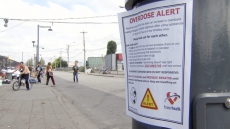VANCOUVER — The Canadian government was aware and warned repeatedly years before an arcane law began stripping longtime Canadians of their citizenship, says a man who spent decades lobbying for change.
Bill Janzen, the former head of the Mennonite Central Committee's office in Ottawa, said he and his colleagues met with the federal government throughout the 1980s and 1990s to find a fix to the so-called 28-year rule.
The provision was part of a 1977 law that automatically removed citizenship from people born abroad to Canadian parents who were also born outside the country.
"The government holds a big responsibility for this," Janzen said. "They've created a mess."
The law applies to people born between Feb. 15, 1977, and April 16, 1981, no matter how quickly after their birth they moved to Canada. It was rescinded in 2009, but the change didn't apply retroactively.
The only way to prevent the automatic loss of citizenship was to apply to retain it before the age of 28 — a detail legal experts contend the government failed to adequately communicate to those affected.
Janzen said he has heard numerous stories of people going to citizenship officials and being told they had never heard of the law.
"They said, 'Don't worry about it. Go home and enjoy Canada. ... Once a Canadian, always a Canadian,' " Janzen said, noting that officials often pointed out the absence of any expiry date on their citizenship cards.
"It happened again and again and again."
Janzen has helped more than 180 people navigate the expensive and time-intensive process of regaining their citizenship over the years, So far, 160 requests have been approved.

Immigration Minister John McCallum could not be reached for comment, but a spokeswoman for Citizenship and Immigration Canada said in an email the government advised those affected "when possible" of the need to apply before the age of 28 to retain their citizenship.
"As we do not have data on the number of individuals who might have been impacted, we were unable to advise people systematically," Sonia Lesage wrote, adding that the number of people who remain affected is "very small."
Lesage said the immigration minister has discretionary authority to grant citizenship in "cases of special and unusual hardship" and she encouraged anyone who thinks they might be affected to contact the department.
Pete Giesbrecht knows the fear, frustration and embarrassment of having his citizenship evaporate without warning.
The 37-year-old man was called to the police station one morning last November in a small community in southern Manitoba and abruptly told by immigration officials he would be deported unless he voluntarily left the country within 30 days, he said.
Giesbrecht was born in Mexico but in 1990 at about the age of eight he moved to Canada, where he grew up, got a job, paid taxes, married a Canadian woman and fathered three children. He doesn't speak Spanish.
Sponsored by his wife, Giesbrecht now has a permit allowing him to work in Canada and is partway through the process of becoming a landed immigrant. But hiring an immigration lawyer to fight his initial deportation order and applying for the necessary paperwork wasn't straightforward or cheap, he said.
"I've spent $7,000 so far," he said, adding that he feels let down by the only country he's ever called home.

"It burned. It burned a lot. I was extremely embarrassed," he said. "Word spread like wildfire."
Janzen said cost is a big challenge for many of the people caught by the 28-year rule, some of whom are "desperately poor."
"If your basic legal status is not settled, it's so paralyzing," he said. "For some of them, they've known there's a problem and they've not known how to solve it (so) they've lived under the wire secretly. That's no way to live."
While other cases do exist, the issue appears to have had a disproportionate impact on Canada's Mennonite community.
James Schellenberg of the Mennonite Central Committee described many of those affected as descendants of Mennonites who, by and large, left Canada in the 1920s for Mexico, Paraguay and elsewhere in Central and South America.
Starting in 2003, two years before the first of those who were affected began turning 28, Mennonite officials put advertisements warning of the law in newspapers popular among Mennonites.
Some people inquired at immigration offices but officials told them not to worry, said Marvin Dueck, an Ontario-based immigration lawyer who has worked on about 50 lost-citizenship cases.
"Once a Canadian, always a Canadian. That was a common response," Dueck said. "And once a government official says that, why should they trust the Mennonite Central Committee?"
Stefan Janzen of Surrey, B.C., was caught by the 28-year rule but was able to regain his citizenship after years of work.
"Everyone I talked to seemed very confused. They didn't know what exactly was going on," he said. "They thought I was a citizen but they weren't quite sure."
After being directed to file the incorrect paperwork, Janzen eventually made the correct application and had his Canadian status restored at a citizenship ceremony in June 2013.

Instead of using a landed-immigrant card to sign in like all the other soon-to-be Canadians, Janzen raised some eyebrows when he presented his Canadian passport.
He said he wants the government to find a solution and notify those affected.
"With technology and computers, they should be able to go through a list and figure out who's in this."




